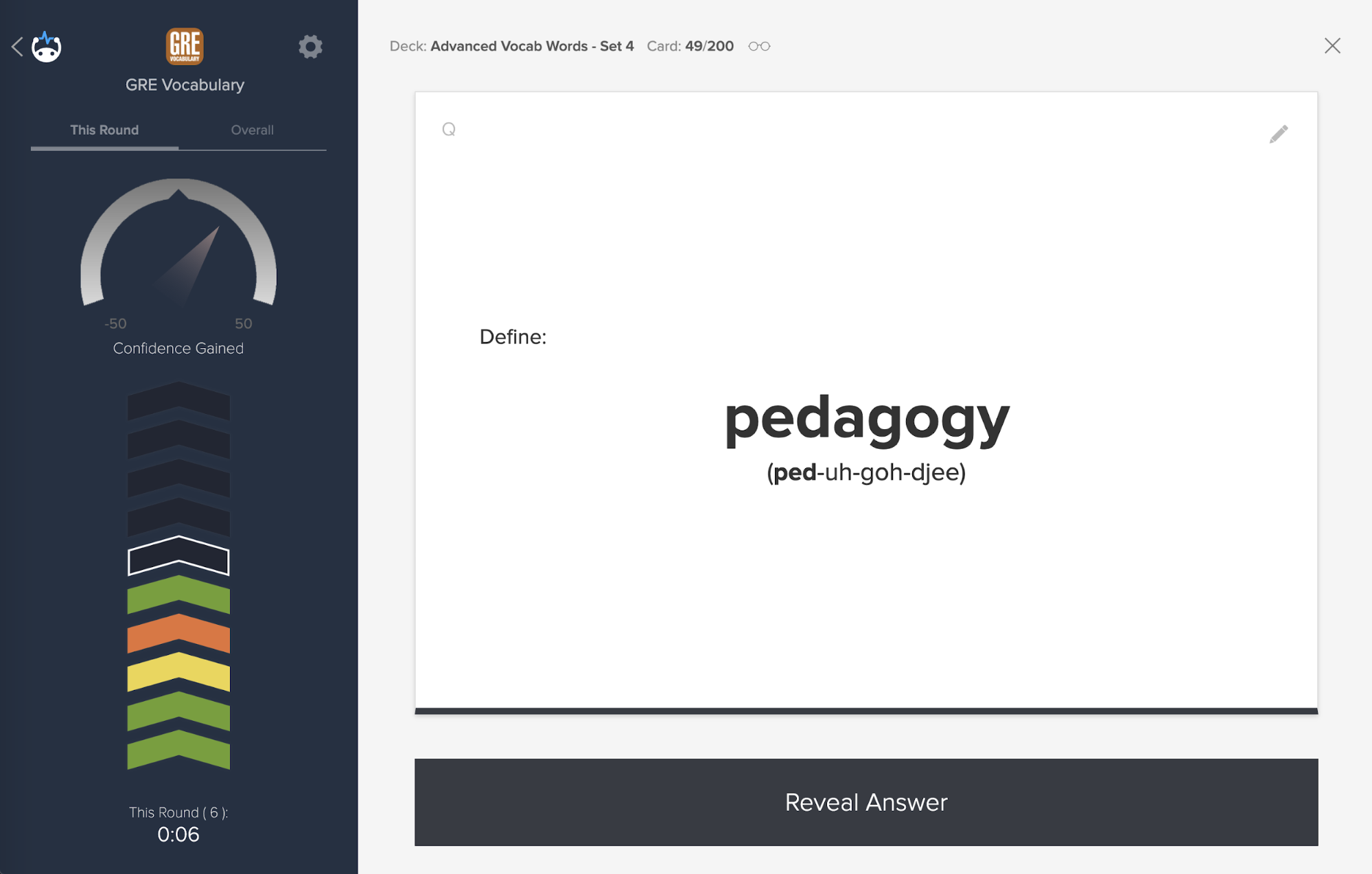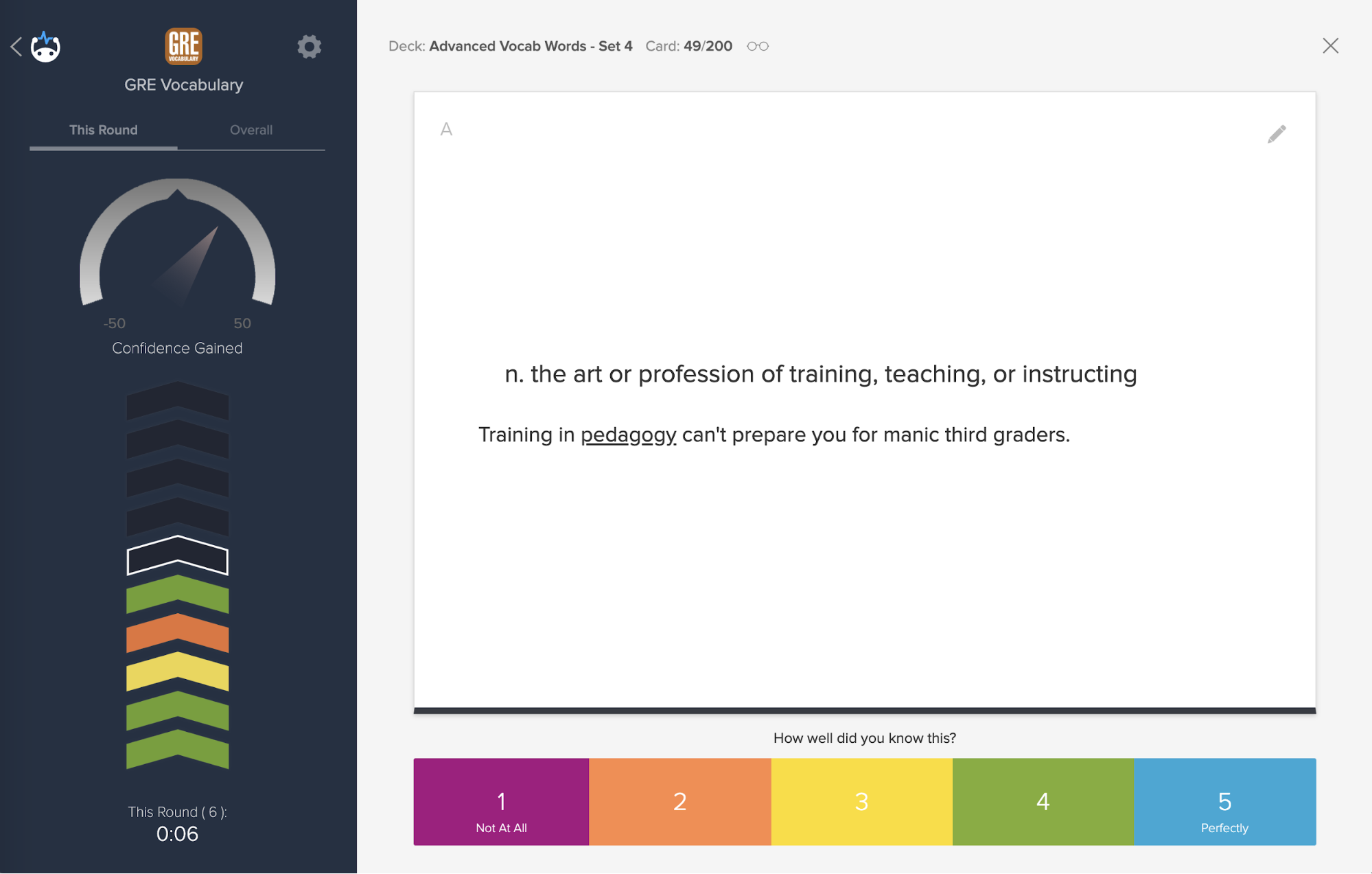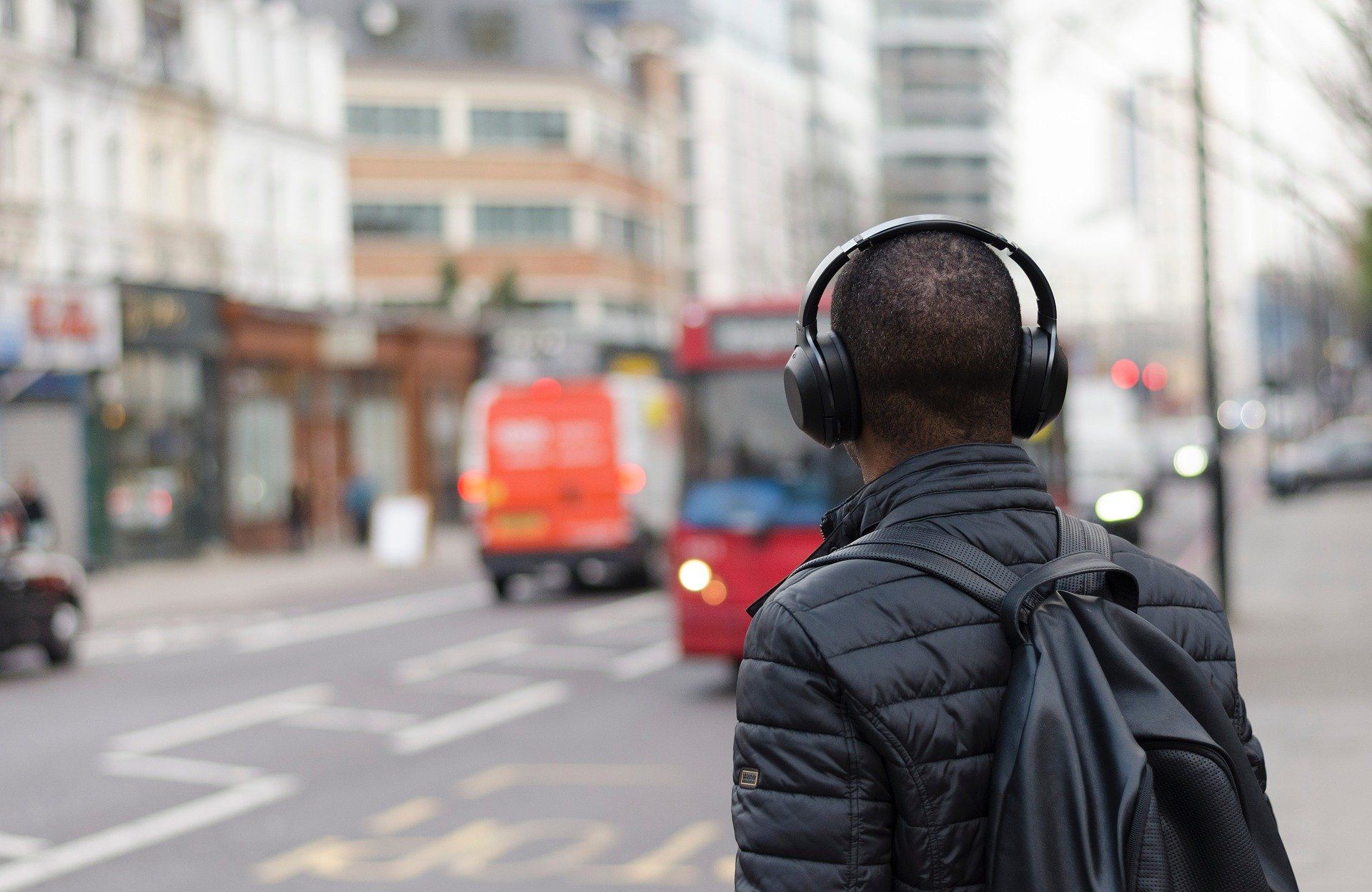There are no two ways about it. The mastery of any area of study requires you to bank veritable dictionaries' worth of vocabulary. From important medical terminology, the names of major historical figures, and legal concepts, to Mandarin symbols, the conjugation of French verbs, and advanced marketing principles ... if you want to learn any subject or any language (including your own), you have to learn how to memorize vocabulary.
The more words you learn, the better your dexterity in your chosen language or subject. And this goes a long way in helping you further your education, ace your exams, and even succeed in the workplace!
So, whether you want to (1) prepare for an upcoming biology exam, (2) learn a new language, or (3) finally outsmart your girlfriend in an argument, we’re going to reveal the best ways to memorize new vocabulary!
First and foremost, the key lies in leveraging two important cognitive learning principles ...
Using SCIENCE to memorize vocabulary!
‘Active recall’ and ‘spaced repetition’ may sound like science fiction novels but they are, in fact, two really useful cognitive learning principles:
Active recall
The first, active recall, simply refers to the remembering of information from, well, memory! Rather than referring to a textbook or your study notes, actively recalling information requires your brain to sift through your mental library, find the relevant dictionary, and pluck a learned word or morsel of information from it.
For example: What is a Riesling? It’s a white grape variety, originating from the Rhine region, used to make aromatic wines.
You do this all the time without any mental effort: when remembering your phone number, physical address, or you and your spouse’s anniversary (or so one would hope).
It takes a little more mental effort to remember new information. But it’s in the process of actively recalling information that deeper neural pathways are formed, thereby helping our brain record more permanent memories.

Spaced repetition
Spaced repetition, on the other hand, is your exposure to new information again and again, at intervals that are carefully determined to optimize your learning. For example: if you were using flashcards, you might review a particularly difficult word again every four or five cards, and an easier word every 12 to 15 cards. Your repeated exposure to the information helps you learn that word more efficiently.
Make sense, doesn’t it?
Now, combine the two cognitive principles—active recall and spaced repetition—and what do you get? A totally awesome and efficient way to memorize vocabulary, whether it’s learning French, Shakespearean English, Mandarin, or complex biology, history, or finance terms.
This is precisely the crafty trick that Brainscape’s adaptive web and mobile flashcards app leverages in order to help its users, like you, on board a cornucopia of fresh vocabulary in just about any language. Through the study of digital flashcards (on any device, big or small), our intelligent spaced repetition algorithm compels students to repeat the mental retrieval of information over increasingly longer intervals of time.
And THIS is what really solidifies vocab and their definitions in HALF the time it might ordinarily take you.
With that science out of the way, let’s now discuss two steps to learning how to memorize vocabulary and the popular vocab techniques that don't work.
Here's to all the wonderful ways you can turn an ordinary day into a learning fiesta!

(That’s a “celebration” in Spanish.)
Step 1. Build your vocabulary list
The first step is easy: compile a list of words you want to learn. Here’s where and how you can do that!
1. In class
If you’re learning a language or subject in school or college, your textbook and teacher will have extensive lists of vocabulary for you to learn. This is a great resource to get you started.
2. Your readings
Keep a pen and paper handy when you read a book, magazine, or anything else really—whether for school or pleasure—and keep a list of words or complex terms you’re unfamiliar with. Then, when you sit down to study, create flashcards for these words. Words coming from real-world experience are so much more likely to "stick" when you study them later than those you just try to learn from a random list or homework assignment.
3. On "the street"
Every time you are exposed to a new word or phrase with a conversation partner, fellow student, or colleague, make a mental note to look it up and study later. This is really great for picking up on all the industry terms, slang expressions, colloquialisms, and (in the case of learning languages) swear words your formal education tragically omits!
You could do this on the fly with the Brainscape app, which allows you to login and create new flashcards in seconds!
4. Get premade flashcards
If you really want a shortcut to the good stuff, simply find premade flashcards in Brainscape’s extensive library. It's overflowing with awesome content for learning foreign languages, vocab builder flashcards for stronger English, and other subjects that require you to master a smorgasbord of different terms and concepts, such as biology, law, and medicine.
Simply get the Brainscape app on your phone and instead of trolling your ex on Instagram, learn new words and get smarter.
Step 2. Study your list to memorize new vocabulary

Now that you have your comprehensive list of words you wish to learn, it’s time to start memorizing it. Truth be told, we don’t really love the word “memorize”. It seems trivial: as though you’re only remembering new words for the sake of remembering them, when in fact each word is a tiny, essential nut or bolt in the grand dynamic mechanism that is the language or the subject you’re learning.
So, when we say “memorize” rather think of it as internalizing the vocabulary: making it a permanent resource in your mental library to use in your everyday interactions and communications. Internalizing new vocabulary, rather than parrot-fashion learning it, will save you from having to re-learn the same words in the future, which is a waste of time.
Capiche?
(That’s Italian slang for “do you understand?” but said in Marlon Brando’s hoarse lisp.)
Here are five tips for how to memorize your vocabulary list.
Tip 1. Make a flashcard for each word
As soon as you have been exposed to a new word or term—whether via a textbook or in conversation with someone—make a flashcard for it. You don’t have to rush home and cut out and write on a square piece of cardboard (unless you’re really Old School). Rather, use Brainscape’s online flashcards app!
Simply whip out your phone or laptop and:
- Create a class in Brainscape (E.g. “Biology 101”).
- Create a new deck (E.g. “Cellular Biology Terms”).
- Populate your deck with flashcards, creating one flashcard per new word.
For each digital flashcard, write the word (and maybe a pronunciation) on the front of the card and the definition and sample sentence(s) on the back. For example:

[See our complete guide to making & studying digital flashcards (NNL)]
Tip 2. Study your flashcards
Once you’ve created your vocab flashcards (or found some premade flashcards in our library), you can access and study them on any device, anytime, anywhere.
Just think of the possibilities: Turn that boring college commute into a Spanish fiesta of new words ... or your boyfriend’s obsession with Star Wars into an opportunity to brush up on your MCAT medical terms, while benefiting from those geeky cognitive science terms we mentioned earlier: active recall and spaced repetition.
There is a third facet to the science behind Brainscape we haven’t yet mentioned: metacognition.
As you flip through your Brainscape flashcards, you’ll be asked to rate your confidence in each new vocab word on a scale of 1 to 5 with 1 being “what the heck does that mean?” and 5 being “I know exactly what that means!”

Using your feedback, our savvy spaced repetition algorithm calculates the perfect interval of time to wait before showing you that card again. The lower-confidence words will show up more frequently until you become familiar with them and increase their rating. Eventually, you’ll rate your understanding a 5 out of 5 and that new vocab word will be banked!
This is spaced repetition in motion (isn’t it beautiful?). But it begins with metacognition, which is you asking yourself how well you knew the answer to the flashcard (or the definition of the word on it). Engaging metacognition is a super powerful and efficient way of memorizing new vocab because it forces you to pay attention, not only to the information but to how well you know that information. And this deepens the memory trace.
Just be sure to study your flashcards in both directions (word → definition and definition → word) and shuffle your cards too so that your brain doesn’t try to cheat by latching on to patterns.
Tip 3. Do the vocab exercises provided by your textbook or worksheets
There’s no point learning new vocabulary or terms without understanding how those words work in sentences. Seeing these words in motion and within the greater context of the language or the subject will help you memorize them better since your brain now attaches meaning to them.
So it’s important that, in addition to regular flashcard study, you practice the exercises in your language workbook, textbook, or course. Challenge yourself to use these new words and terms in your answers and essays so that they become a working part of your vocabulary.
Tip 4. Use the Feynman Technique
Richard Feynman was a theoretical physicist who was also rather interested in effective learning techniques. What he believed is that reciting everything you know about a subject from scratch (i.e. active recall) and being able to explain or teach it in simple terms to, for example, a sixth-grader is the true test of having mastered that subject.
This—the Feynman Technique—has become a popular method for consolidating what you’ve learned. In the context of how to memorize vocabulary, it compels your brain to actively dig into your mental bank of words, rather than just passively recognizing the right answer to a question.
How can you use the Feynman Technique to practice your vocab?
Review a specific list of a few dozen words (or, for example, open a deck of Brainscape flashcards in “preview mode” so you can see the whole deck at once). Then, cover your list or close the app and see how much you can remember from scratch, teaching it to an imaginary student ... or to a pot plant (they’re great listeners).
See more tips on how to use the Feynman Technique.
Tip 5. Use the words in your daily life
You’ll know you have truly internalized a new word when you’re able to use it in your written and/or spoken communication. So, in addition to practicing those flashcards and workbook exercises, and teaching the words out loud to your Delicious Monster plant, try to use the words and terms in your conversations with peers, colleagues, and teachers, and in your written work.
Popular memorization techniques that don't work as well

At this point, you are fully equipped with the tools you need to memorize new words and build your vocabulary. But before we unleash you upon your studies, let’s discuss the efficacy of a few popular learning techniques that unfortunately fall short:
1. Mnemonic devices
“Betty eats cakes and uncle sells eggs.”
This is how I learned to spell the word “b-e-c-a-u-s-e” in first grade.
Mnemonics are memory devices that help learners recall larger pieces of information. While they’re kinda cute, they can be confusing and time-consuming because they require you to remember TWO things: the cute association and the word’s meaning. Why bother? Rather keep it simple with flashcards, where you can repeatedly drill the actual concept and not some superfluous meta-concept.
2. Vocab games
Vocab games are designed to encourage your enthusiasm for learning, but there are other, more effective ways to improve your motivation. The main problem with vocab games is that they don’t present words to you in a way that teaches you how to use them.
Rather, they work off of recognition and patterns. Without engaging your powers of active recall, metacognition, and spaced repetition (like Brainscape does), any learning you glean from vocab games is really surface level.
(See why active recall is the secret to learning faster.)
3. Audiotapes

One might think that listening to a language is an amazing way to fill otherwise unproductive time, such as when commuting to work or at the gym. But the problem with any audio-only solution is that it involves passive learning.
Without any real interaction with the language, you won’t learn as quickly. Additionally, audio programs cannot be tailored to your specific needs and you may end up spending excessive amounts of time listening to words you already know perfectly because they’re mixed in with the words you don’t know so well.
Worse still, you can only learn the words as quickly as the voice on the tape can speak, which can be frustratingly slow. So while audio tapes are better than nothing during your downtime, they are not a panacea for quickly building a vocabulary.
“Panacea” is a solution or remedy for all difficulties or diseases (go make a flashcard for that)!
4. Word-of-the-day calendars
Ugh, really? It takes thousands of new words to significantly improve your vocabulary, whether it’s for a language or a complex subject, like anatomy. But there are only 365 days in a year. Plus, once you’ve seen a word and chucked away the page, you can’t study, practice, and review it the way you need to in order to permanently remember that word.
Word-of-the-day calendars are cute gifts, but little else (unless you make a flashcard for each new word you learn!).
How to memorize vocabulary like a boss
Memorizing (or rather internalizing) new words and vocabulary is a fundamental aspect of learning a new language, mastering your native tongue, and becoming fluent in the lexicon of any subject.
The best way to build a more comprehensive arsenal of words is by engaging your powers of active recall, spaced repetition, and metacognition, as we have discussed in this “how to memorize vocab” guide.
Brainscape’s intelligent and adaptive learning flashcard app leverages all three of these cognitive principles, while also being fun and engaging to use. So, heed our advice, use our app, and profit from the fruits of your labors with higher grades, better conversations, smoother transactions, and directions to the bathroom that you can actually follow.
You’re welcome.
References
Armstrong, R., Arnott, W., Copland, D. A., McMahon, K., Khan, A., Najman, J. M., & Scott, J. G. (2016). Change in receptive vocabulary from childhood to adulthood: associated mental health, education and employment outcomes. International Journal of Language & Communication Disorders, 52(5), 561–572. https://doi.org/10.1111/1460-6984.12301
Chukharev-Hudilainen, E., & Klepikova, T. A. (2016). The effectiveness of computer-based spaced repetition in foreign language vocabulary instruction: A double-blind study. Calico Journal, 33(3), 334-354. https://doi.org/10.1558/cj.v33i3.26055
Fengyu, Z. (2023). The impact of vocabulary learning methods on students’ vocabulary application skills. English Language Teaching and Linguistics Studies, 5(4), p206. https://doi.org/10.22158/eltls.v5n4p206
Smolen, P., Zhang, Y., & Byrne, J. H. (2016). The right time to learn: mechanisms and optimization of spaced learning. Nature Reviews. Neuroscience, 17(2), 77–88. https://doi.org/10.1038/nrn.2015.18
Sprenger, M. (2013). Teaching the critical vocabulary of the common core. Alexandria, VA: ASCD.
University of Colorado Boulder. (2020, August 7). The Feynman technique. A&S Academic Advising and Coaching. https://www.colorado.edu/artssciences-advising/resource-library/life-skills/the-feynman-technique-in-academic-coaching
Wang, Q. (2023). Memorization strategy and foreign language learning: a narrative literature review. Frontiers in Psychology, 14. https://doi.org/10.3389/fpsyg.2023.1261220
Windsor University School of Medicine. (2023, September 26). Active recall – How to use this effective study technique to score a good GPA? https://www.windsor.edu/active-recall-how-to-use-this-effective-study-technique-to-score-a-good-gpa/
